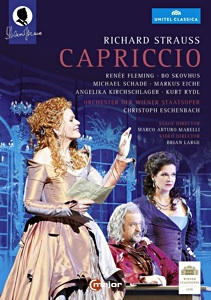
Soprano Renée Fleming is certainly making the role of the Countess in Richard Strauss’s final opera Capriccio the focus of her late-career years. After her Met run in 2010, she has made various stops in the role, including this 2013 Wiener Staatsoper production, released
by Unitel Classica and directed for video by Brian Large, and she will bring her Countess to Chicago and Dresden in the coming months. The role certainly suits her natural elegance and charm, and sits well in her current vocal estate.
But Strauss’ “Conversation piece of an opera”, with its ad nauseam debate about the relative importance of words and music in the operatic art form leaves many an audience cold. The story feels arch, overly intellectual, and somewhat limited to an audience that actually cares about all the elements that go in to creating great art. From a human relationship context, it’s rather cold and brittle. Only in the Countess’ final scene do Strauss and his co-librettist Clemens Krauss make the character into a three-dimensional human being with depth of feeling and real personal needs.
There is great Strauss music in this opera, but I find it mostly confined to orchestral interludes and the aforementioned final scene, where the rapturous music we expect from the mature Strauss finally erupts. Here in this production directed by Marco Arturo Marelli, the opera’s tendency to fussiness and preciousness is ill served in a fussy, precious production. Marelli’s sets and lighting, though ravishingly beautiful to the eye, simply reinforce the sense of the opera as a cold, brittle exercise.
Deep blues and décor resembling ice sculptures in the Countess’ salon are great hindrances to finding the humanity of the characters (this would be a great set for The Snow Queen or maybe a stage version of Frozen.) The great danger here is allowing the Count and Countess to seem rich dilettantes dabbling and slumming with their favorite artists, and this production falls straight into that trap, despite the best efforts of Fleming and Bo Skovhus (The Count) to seem engaged and committed. The interplay between the brother and sister in this production is sadly cloying and cutesy.
Three singers manage to rise above these concerns. Michael Schade (as the composer Flamand) and especially Markus Eiche (as the poet Olivier) give impassioned performances both in the words vs. music debate and in their ardent romantic pursuit of the widowed Countess. Fleming, too, is at her best in the scenes with these two singing actors. I also was quite pleased by Angelika Kirchschlager’s feisty and fiery, take-no-prisoners approach to the role of the famous tragedienne Clairon. Here was an actress who knew just what she wanted on and off the stage, and set about to get it.
The veteran Kurt Rydl plays the director LaRoche with too much bluster and not enough heart. While he did rouse himself for the great monologue where LaRoche defends the traditions of the theatre, in much of the rest he was too much bark and not enough bite, delivered rather wobbily.
A few years back, I reviewed the Met DVD for this site in the 2010 production. In that review, I found Fleming in good voice but rather remote in characterization. In the Staatsoper DVD, something of that is reversed. The voice has lost significant luster and creaminess in the upper range, and occasional lunging for high notes has begun. The middle voice is still strong. In this DVD, one gets the feeling that Fleming is “saving up” for her exquisite final scene, and doesn’t give her all until that moment (I had the same feeling about Leontyne Price in her final run of Aïdas, that she was saving up for “O patria mia.”)
I find Fleming’s acting somewhat improved—there is less generalized elegance and more specific reactions to other characters and situations. But I still have the feeling that she’s crafting facial expressions rather than fully believing in the Countess’ longings and desires. There is a lack of generosity in Ms. Fleming’s performances. It’s all there, but she doesn’t seem willing to send it over the footlights.
Conductor Christopher Eschenbach does glorious work in the orchestral passages, but the tempos are languid to the point of distorting phrases during most of the singing. This video runs 163 minutes. The Met version ran 149. While this conducting really brings beauty and clarity and subtle shadings to some particular moments, it harms the overall flow of the score.

























Comments